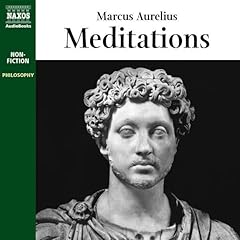
The Golden Sayings of Epictetus
What's the Big Idea?
No se pudo agregar al carrito
Add to Cart failed.
Error al Agregar a Lista de Deseos.
Error al eliminar de la lista de deseos.
Error al añadir a tu biblioteca
Error al seguir el podcast
Error al dejar de seguir el podcast
Prueba gratis de 30 días de Audible Standard
Compra ahora por $13.21
-
Narrado por:
-
David L. Stanley
-
De:
-
Epictetus
What’s the big idea? Former slave Epictetus argues that since we cannot control the external world, true freedom comes from the reasoned control of one’s own desires and passions.
This is the core of Stoic thought that Epictetus taught in Western Greece about AD 100. Stoicism became the dominant moral philosophy of the Hellenistic and Roman world, and Epictetus became its dominant and most respected teacher.
Though Epictetus wrote nothing that has survived, writer Arrian attended his lectures and took those notes that preserved Epictetus’ teachings. Besides Arrian, Epictetus had another notable listener, the young Publius Aelius Hadrianus, who would go on to become Roman Emperor Hadrian, reigning from AD 117 to 138.
Stoic philosophy echoed down the centuries, starting with St. Paul, whose “Acts” is shot through with Stoic thought. St. Ambrose and Tertullian show Stoic influence in their writings.
In the modern world, Stoicism remains important. Prussian emperor Frederick the Great, essayist Montaigne, and even George Washington were inspired by the Stoics. Perhaps the most prominent modern writer influenced by the stoics is American essayist Ralph Waldo Emerson. His Man the Reformer and Self Reliance are almost modern Stoic handbooks.
Let’s go back a couple of thousand years to Nicopolis and listen to Epictetus explain Stoicism. We can cheat a bit and look over Arrian’s shoulder and hear his lecture notes.
©2021 Bill McGann (P)2022 Bill McGannLos oyentes también disfrutaron:




















Also, I felt, for now, I would bog down with, say, 13 hours of this stuff. This selection gets to the point!
Incredible for getting one's composure
Se ha producido un error. Vuelve a intentarlo dentro de unos minutos.


